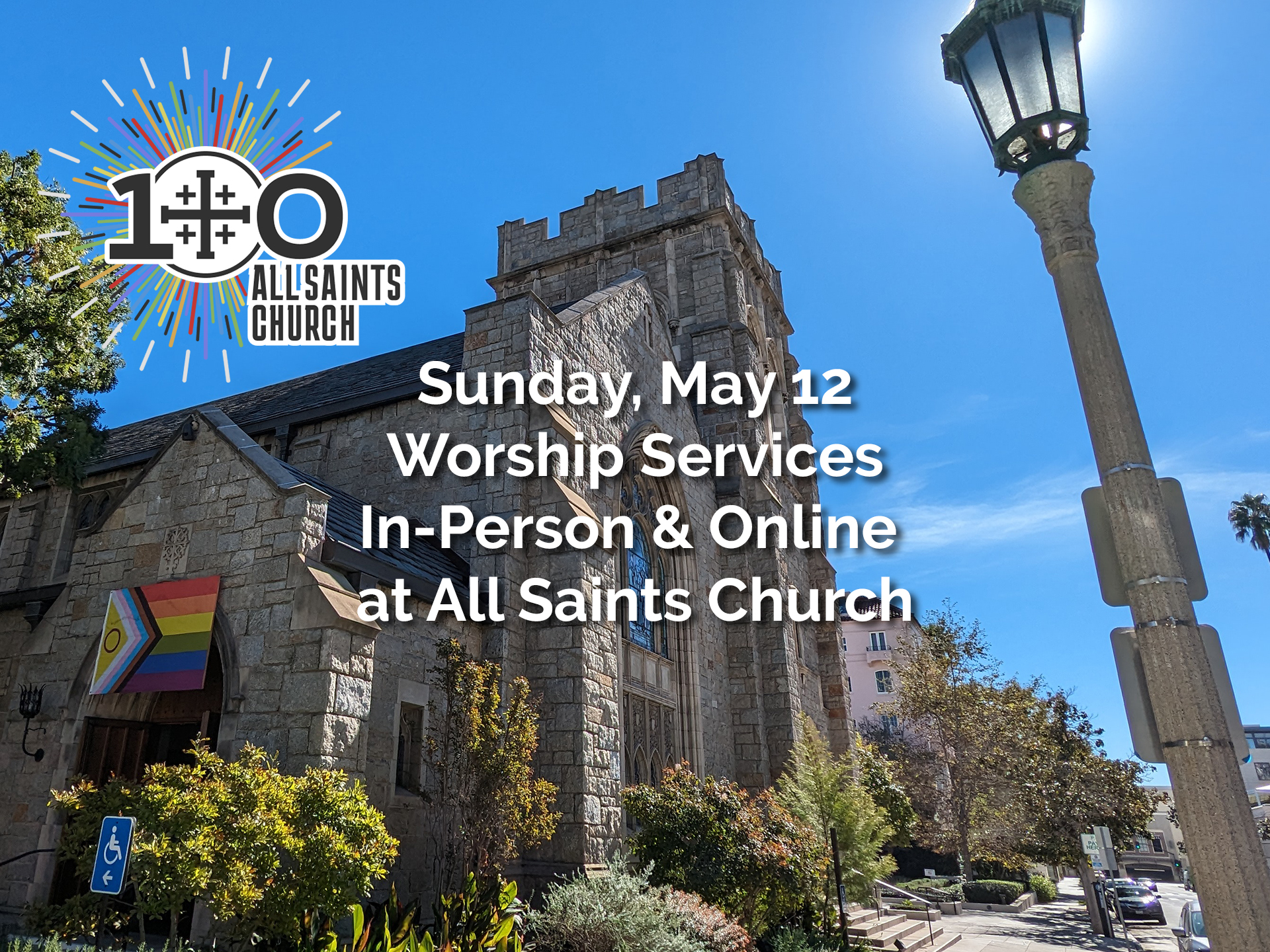“Let us claim this moment and turn it into the movement the world is waiting for — a movement of love, justice and compassion rooted in the unassailable truth of God’s inexhaustible love for absolutely every single member of the human family.”
Sermon by Susan Russell at All Saints Church, Pasadena, on Trinity Sunday, May 27, 2018.
========
Then I heard the voice of the Holy one saying, “Whom shall I send? Who will go for us?” “Here I am,” I said, “send me!” Amen.
+
So I don’t know if you heard about it, but last week a former helicopter pilot and an American actress got married across the pond. And our Presiding Bishop Michael Curry got the preaching gig.
It truly was as if the Holy one looked down on this sin-sick, war-weary, polarized and divided world and — reprising the words from our text this morning from Isaiah — said “Whom shall I send? Who will go for us?”
And Michael Bruce Curry raised his hand and said: “Here I am. Send me.”
And boy howdy did he deliver! He delivered a powerful witness to God’s inclusive love that may have jarred just a few of our CofE siblings because of its exuberant delivery but inspired not only the world and the groom … who turned to his bride at the end and mouthed one word: “Wow!”
In case you missed it … and my FB and Twitter feeds suggest not too many people did … here is a stand-out quote that arguably summarizes not only this wedding homily but the work and witness of the Gospel at its best:
“Imagine a world where love is the way. Imagine our homes and families, neighborhoods and communities, governments and nations, business and commerce where love is the way….When love is the way then no child will go to bed hungry in this world ever again, we will let justice roll down like a mighty stream and righteousness like a ever-flowing brook, poverty will become history, the earth will be a sanctuary, we will lay down our swords and shields down by the riverside to study war no more. When love is the way, there’s plenty good room for all of God’s children.”
It touched millions of hearts, minds and twitter feeds around the globe as #LoveIsTheWay became a trending hashtag and Episcopalian was the most searched word on Google.
In a SkyNews interview with Archbishop of Canterbury Justin Welby exclaimed “What we saw was that preaching is not a past art: that the use of language to communicate the good news of Jesus Christ just blew the place open … it was fantastic!”
And with those words we heard the Archbishop of Canterbury putting to rest once-and-for all (we can hope) the fantasy that differences have to become divisions and reminding us that as members of the Anglican Communion what unites us is far stronger than whatever may be leveraged to try to divide us.
(Of particular interest to anyone heading to Austin in July for the Episcopal Church’s 79th General Convention … just sayin’.)
Some of you will remember that exactly ten years ago we were sweating out the beginning of Lambeth 2008 — the every ten year gathering of bishops from all around the global Anglican Communion — under the cloud of threats that the American Episcopal Church would be voted off the Anglican Island because of our commitment to full inclusion for LGBTQ people.
But instead of caving to the blackmail, the American Episcopal Church stayed the course, continued to expand the circle and in 2015 we not only changed our canons to make the sacrament of marriage equally available to all couples seeking God’s blessing on their lives and on their love, we elected Michael Curry — a prophetic, outspoken champion of inclusion — as our Presiding Bishop.
I think it is fair to say that those of us who survived Lambeth 2008 could not have imagined — in even our wildest dreams — that we would be where we are today … and yet, here we are.
And where we are is a moment where national and international attention is shining on the Episcopal Church — inarguably for a brief moment because that’s how this works — so let’s seize it.
Let’s claim this moment and turn it into the movement the world is waiting for — a movement of love, justice and compassion rooted in the unassailable truth of God’s inexhaustible love for absolutely every single member of the human family:
A movement offering an antidote to the toxic rhetoric of fear, judgment and condemnation which has for far too long hijacked the Christian Gospel and turned it into a weapon of mass discrimination.
Just as Michael Curry responded to God’s call with “here I am; send me” let us — the Episcopal Church in general and All Saints in particular — say “here we are; send us!” and turn this into a teachable moment that will transform not only hearts and minds but the world.
And for an example of the transformative power of teachable moments we don’t have to go any further than Nicodemus in this morning’s Gospel: a perfect example of someone of good faith with great intentions and a sincerely seeking heart utterly missing the point Jesus was trying to make by falling into the trap labeled “literalism.”
I love Nicodemus. And even more than I love him I love how graciously and patiently Jesus does not give up on Nicodemus — even after he asks one question after the other … even as he seems determined not to “get” that being born from above (other translations call it “born again”) has nothing to do with a physical birth but with a spiritual re-birth.
And what we know if we read this text in the context of the whole Gospel of John is that conversation we hear this morning can’t have been the only one Jesus and Nicodemus had.
The others aren’t preserved for us – by John or by anybody else — but the two other places Nicodemus shows up later in John’s gospel tell us something happened to move him beyond the limits of the literalism that kept him from seeing the wideness and abundance of God’s love, justice and compassion into a place of not only understanding what Jesus was talking about … but acting on it.
In chapter seven he shows up during a debate between Pharisees and the temple guards about what to do about this radical rabbi from Nazareth:
Nicodemus, who had gone to Jesus earlier and who was one of their own number, asked, “Does our law condemn a man without first hearing him to find out what he has been doing?” They replied, “Are you from Galilee, too? Look into it, and you will find that a prophet does not come out of Galilee.” Then they all went home.
So Nicodemus – a teacher and political leader – has gone from a clandestine meeting with Jesus under the cover of darkness to standing up in the Sanhedrin (think Senate or House investigative committee hearing!) to defend him.
But wait – there’s more! The third and final time we encounter Nicodemus is in the nineteenth chapter of John … just after the crucifixion … where John tells us:
“Joseph of Arimathea came and took the body away. He was accompanied by Nicodemus, the man who earlier had visited Jesus at night. Nicodemus brought a mixture of myrrh and aloes, about seventy-five pounds. Taking Jesus’ body, the two of them wrapped it, with the spices, in strips of linen … and since the tomb was nearby, they laid Jesus there.”
From the poster child for missing the point
of the Good News Jesus had come to proclaim
to standing up and speaking truth to power
in his defense at the Sanhedrin
to courageously seeing to it that Jesus was properly buried
after all the disciples had fled in fear, terror and disappointment —
by the end of the story
Nicodemus is a living example of what that re-birth looks like:
of someone who both stepped out and spoke up.
He is an icon of transformation.
The first step on that transformational journey for Nicodemus was moving beyond the limits of literalism and being open to what Jesus so patiently tried to teach him … and us … in this third chapter of John.
“The wind blows where it will,” Jesus said. And that is as true for us as it was for Nicodemus, for that wind is still blowing. The wind of change. The wind of challenge. The wind of the Holy Spirit.
And so as we seize the teachable moment of the attention we are getting
thanks to that wedding sermon across the pond,
let us be the place where those who come to us
as Nicodemus went to Jesus
will be transformed as we continue to be transformed …
to find their way beyond the literal to see the Living Word at work in our world
and to boldly proclaim God’s Good News to all
as we stand with the marginalized and oppressed;
to say “Here we are, send us.”
And Lord knows the world around us is giving us plenty of places to go;
there is plenty of work to do!
• To stand with those on our borders who come seeking refuge and instead have their children wrenched from their arms.
• To lobby our elected officials to work for a just and equitable peace in the Middle East and an end to the occupation of Gaza.
• To follow the leadership of our youth in becoming a nation where we love our children more than our guns.
• To offer a rebuttal to hate speech by Franklin Graham — or anyone else — who attacks LGBTQ people and our Muslim siblings
And to kneel with those who protest white supremacy and systemic racism as we recognize the deep irony that as we spend this Memorial Day Weekend remembering those who swore to defend the Constitution against all enemies — foreign and domestic — that the Constitutional right to free speech and expression they died protecting is under direct attack by some of the very elected officials who have sworn to protect it as well.
Yes, my brothers, sisters and gender non-conforming siblings, there is sadly no shortage of opportunities to answer “Here we are: send us” to God’s question “Who will go?”
But the good news is we have Good News to tell … and that wherever God sends us we never go there alone.
In closing, I can think of no better words on this Trinity Sunday to celebrate the mystery of the unity of the God who is the source of all love — who loved us enough to become one of us — and who sends us out into the world to love one another — than this prayer by the awesome Reverend Yolanda Norton:
“Our Mother,
who is in heaven and within us,
We call upon your names.
Your wisdom come.
Your will be done,
In all the spaces in which You dwell.
Give us each day
Sustenance and perseverance.
Remind us of our limits as
we give grace to the limits of others.
Separate us from the temptation of empire,
But deliver us into community.
For you are the dwelling place within us
the empowerment around us
and the celebration among us
now and for ever.”
Amen.



